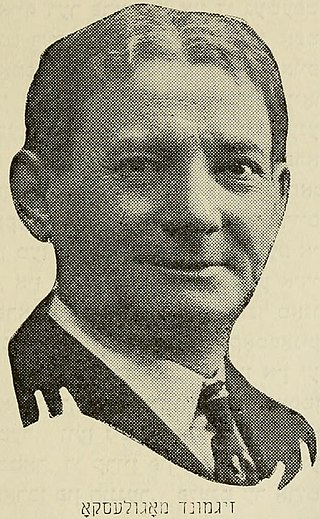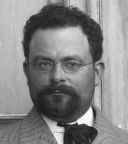
Hanina Karchevsky (died 20 December 1925, age 49), was a Jewish composer, conductor and music teacher who became an important figure in the establishment of the musical culture of the pre-state Yishuv and of Israel.

Hanina Karchevsky (died 20 December 1925, age 49), was a Jewish composer, conductor and music teacher who became an important figure in the establishment of the musical culture of the pre-state Yishuv and of Israel.
Karchevsky was born in 1877 in Petrovka, a village in Russian-ruled Bessarabia. He moved with his parents to the nearby town of Bender, where he studied Torah. At the same time, he learned piano and notation with his teacher, who was also a cantor ( hazzan) where he was heard by the well-known cantor Zeidel Rovner, who convinced his parents to move to Kishinev, so the child could join the synagogue's choir. [1] At the age of 22, he moved to Warsaw, where he conducted an army orchestra. [2]
As a supporter of Zionism, he immigrated to the Land of Israel in 1908, during the Second Aliyah. He taught music there in several institutes, among them the Herzliya Hebrew Gymnasium, where he founded an orchestra and a choir. [2] The choir performed around the country and participated in the inauguration ceremony of the Hebrew University of Jerusalem. He composed children and pioneer songs, as well as orchestral compositions. His songs became very popular in the period, and became milestones in the history of the pre-state Yishuv's and of Israel's musical culture. [1] He also provided free classes for poor children.
On 20 December 1925, he took his own life by hanging himself at his Tel Aviv home. He left behind a mother, and a married sister who was pregnant at the time and a mother to a ten-year-old daughter. The reasons for his suicide remain unclear. [3]
The music of Israel is a combination of Jewish and non-Jewish music traditions that have come together over the course of a century to create a distinctive musical culture. For almost 150 years, musicians have sought original stylistic elements that would define the emerging national spirit. In addition to creating an Israeli style and sound, Israel's musicians have made significant contributions to classical, jazz, pop rock and other international music genres. Since the 1970s, there has been a flowering of musical diversity, with Israeli rock, folk and jazz musicians creating and performing extensively, both locally and abroad. Many of the world's top classical musicians are Israelis or Israeli expatriates. The works of Israeli classical composers have been performed by leading orchestras worldwide.

Shlomo Carlebach, known as Reb Shlomo to his followers, was a rabbi, religious teacher, spiritual leader, composer, and singer dubbed "the singing rabbi" during his lifetime.

Sigmund Mogulesko — Yiddish: זעליק מאָגולעסקאָZelik Mogulesko, first name also sometimes spelled as Zigmund, Siegmund, Zelig, or Selig, last name sometimes spelled Mogulescu — was a singer, actor, and composer in the Yiddish theater in New York City. He was born in Kalarash, Bessarabia and began singing in the local synagogue choir. Before reaching adolescence, he was paid nearly three times what teachers made, to sing in the synagogue of Chişinău. Soon after moving to Bucharest, Romania, he was paid to sing in churches as well as synagogues, and started acting.

Abraham Zevi Idelsohn was a prominent Jewish ethnomusicologist and composer, who conducted several comprehensive studies of Jewish music around the world.
Jewish music is the music and melodies of the Jewish people. There exist both traditions of religious music, as sung at the synagogue and domestic prayers, and of secular music, such as klezmer. While some elements of Jewish music may originate in biblical times, differences of rhythm and sound can be found among later Jewish communities that have been musically influenced by location. In the nineteenth century, religious reform led to composition of ecclesiastic music in the styles of classical music. At the same period, academics began to treat the topic in the light of ethnomusicology. Edwin Seroussi has written, "What is known as 'Jewish music' today is thus the result of complex historical processes". A number of modern Jewish composers have been aware of and influenced by the different traditions of Jewish music.
For the purposes of this article, “contemporary” refers to the period from 1967 to the present day, “Jewish” refers to the various streams and traits of Judaism practiced. Many Orthodox Jews use the term “religious” to refer to a strict adherence to Jewish law. For the purposes of this article, “religious” refers to the content and context of the music itself: liturgical or implicit references to the divine.

Marc Lavry was an Israeli composer and conductor. Born in Latvia and trained in Germany, Lavry immigrated to Palestine in 1936, where he was instrumental in developing the "Mediterranean School" of composition, that merged elements of oriental Jewish and Arab music with modern European classical music.
Simon Arthur Sargon was a composer, pianist, conductor, music educator, and major creative figure in contemporary American Jewish music. His compositions include liturgical and secular pieces; opera and musical theatre; works for youth ensemble; choral and art song; and chamber ensemble and symphonic works.

Moritz Henle was a prominent German composer of liturgical music and cantor of the Jewish reform movement.
Louis Harry Danto was a lyric tenor and cantor. He was acclaimed for his cantorial music, concert appearances and recordings of Italian, Russian, and French opera repertoire. Danto performed throughout North America, Europe and Israel, and recorded 24 solo albums.
Mendi Rodan was an Israeli conductor and educator.
Yosef "Jo" Amar was a Moroccan-Israeli singer and hazzan, notable for his pioneering of the Mizrahi genre and his influence on many artists such as Zohar Argov, Eyal Golan, Ishai Levi and Oren Hen.

Leib Glantz was a Ukrainian-born lyrical tenor cantor (chazzan), composer, musicologist of Jewish music, writer, educator, and Zionist leader.
Ben Steinberg was a Canadian composer, conductor, organist, and music educator. A member of the Canadian League of Composers and an associate of the Canadian Music Centre, he is known for his contributions to Jewish music. He has presented many programs of Jewish music for the Canadian Broadcasting Corporation and has presented similar programs in lecture-recitals throughout Canada, the United States, Australia, and Japan. He has also contributed articles on Jewish music to a number of publications. Several of his original manuscripts and papers are held in the collection at the library of the University of Calgary.

Dov (Dubi) Seltzer is a Romanian-born Israeli composer and conductor.
Samuel Eliezer Goldfarb, was an American composer, arranger, choir conductor, music director, cantor, piano accompanist, and educator.

Bracha Zefira was a pioneering Israeli folk singer, songwriter, musicologist, and actress of Yemenite Jewish origin. She is credited with bringing Yemenite and other Middle Eastern Jewish music into the mix of ethnic music in Palestine to create a new "Israeli style", and opening the way for other Yemenite singers to succeed on the Israeli music scene. Her repertoire, which she estimated at more than 400 songs, included Yemenite, Bukharan, Persian, Ladino, and North African Jewish folk songs, and Arabic and Bedouin folk songs and melodies.
Ben Zion Shenker (1925–2016) was a world-renowned American Hasidic composer and hazzan (cantor), associated with the Modzitz hasidic dynasty. Shenker was born in the heyday of the American hazzan. He became interested in the art as a child, and was performing on radio by his early teens. Soon after, he became close to Rabbi Shaul Taub, the Holocaust-surviving Modzitz Grand Rabbi, who was known for his mystical Hasidic compositions. He dedicated much of his life to recording and publishing the large stock of pre-war Modzitz songs, as well as Taub's post-war work. Shenker created a music label, Neginah, for the purpose of recording those songs, and himself became a composer of hundreds Modzitz moded songs.

Shlomo Simcha Sufrin, better known as Shlomo Simcha is a UK-born Canadian Hasidic Jewish cantor and singer. Shlomo Simcha began his career in a small kollel in Montreal, where he was discovered by a local wedding band leader who brought him onto a project recording a series for children in the Satmar community called Besof Umachol. His work on the series caught the attention of Mendy Werdyger at Aderet Records, who introduced him to producer Sheya Mendlowitz, with whom he would create his first commercial album.

Isaac Hirshow was a Russian-born, naturalised British, cantor who in 1939 became the first person to obtain a Bachelor of Music degree at the University of Glasgow. He served at Garnethill Synagogue for thirty years.